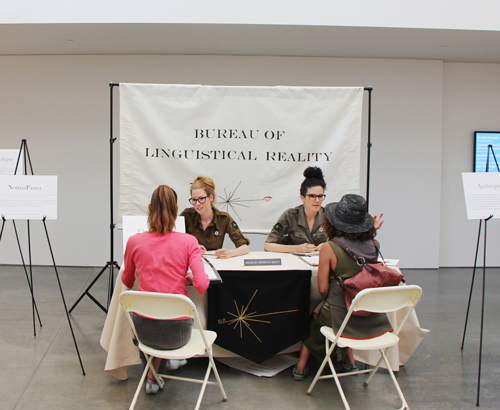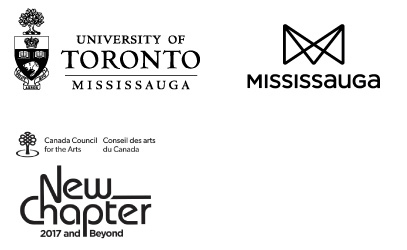
March-September 2019
Events are FREE and open to the public. All are welcome.

The Bureau of Linguistical Reality. Courtesy the artists.
The Society for the Diffusion of Useful Knowledge (SDUK) is a public program and publication series produced by the Blackwood Gallery, University of Toronto Mississauga. Designed to build artistic and environmental literacy and support community engagement, the SDUK platform circulates research, ideas, and debates from a range of exigent discourses and practices, including those among the visual arts, environmental humanities, public policy, political economy, sustainable design, science and technology studies, extinction studies, and the major scientific and cultural debate of a generation—the Anthropocene. This programming is part of The Work of Wind: Air, Land, Sea, a site-specific exhibition, public program, and publication series designed to expand perspectives on climate change through artistic practices, cultural inquiry, and political mobilization.
A series of public programs will be taking place in wards across the City of Mississauga from March to September 2019. For complete details and updates, visit workofwind.ca/programs
Bomb Book Reading + Conversation
Andrea Pinheiro and Joshua D. Pilzer
March 13, 2019
12-1pm
e|gallery, main floor, CCT Building
Revolution Revolution
Gillian Dykeman
March 29-31, 2019
Various locations across Mississauga
Bureau of Linguistical Reality
Private Field Study Salons, June 1–9 with local community organizations
Pop-Up Field Study Office
June 4, 2019
6-8pm
Studio.89, 1065 Canadian Pl #104, Mississauga, ON
Presented in partnership with Green Drinks Mississauga
Reading the River: Session 1
Andrea Muehlebach
June 16, 2019
3:30-5pm
Vic Johnston Community Centre, 335 Church St, Mississauga, ON
un/learning: reimagining the timber farmhouse
sean procyk
June 29, 2019
12-2:30pm
Visual Arts Mississauga at Riverwood, 4170 Riverwood Park Ln, Mississauga, ON
Reading the River: Session 2
Joy Xiang and Julien Gordon
July 27, 2019
2–3:30pm
Port Credit Memorial Arena, 40 Stavebank Rd, Mississauga, ON
Dandelion Variations: Canning Workshop and Conversation
Amanda White and Rav Singh
August 12, 2019
6-8pm
Studio.89, 1065 Canadian Pl #104, Mississauga, ON
Wild Relatives: Screening and Conversation
Jumana Manna, Wild Relatives, 2018
Documentary, 66 minutes
August 25, 2019
Conversation at 7pm
Screening begins at 8pm
Streetsville Village Square, 213 Queen St S, Mississauga, ON
Reading the River: Session 3
Steve G. Hoffman, Zoe Hopkins, and Polina Teif
September 13, 2019
noon-2pm
Digital and Collaborative Research Space, Maanjiwe nendamowinan 3230, University of Toronto Mississauga
For more information please visit workofwind.ca/programs
The Bureau of Linguistical Reality was established in 2014 by two artists who were at a total loss for words to describe emotions and experiences they were having around climate change and other anthropogenic events. The art piece was inspired by the Linguistic Relativity Hypothesis (also known as the Sapir-Whorf), which holds that “the structure of a language affects the ways in which its
respective speakers conceptualize their world” i.e. that humans’ worldview influences their cognitive processes. Alicia Escott is an interdisciplinary artist whose work addresses issues of species-loss, the process of commercial mediation in late-capitalist society, and individual experiences of loss, heartbreak, and longing in the Anthropocene. Her work connects the speed of change today with the speed of change in the geologic history of the planet. Heidi Quante is an artist and founder of the non-profit Creative Catalysts, an organization that brings together experts from diverse disciplines to devise innovative ways to raise awareness, inspire dialogue, and spark action on pressing social and environmental issues.
Gillian Dykeman is a multi-disciplinary artist based in Fredericton, New Brunswick. Working through an intersectional feminist and postcolonial framework, Dykeman seeks to empower her audiences in their own lives through playful and critical engagement with visual culture. Her work spans mediums and disciplines such as performance, video, sound, installation, and art criticism. She has a Masters in Visual Culture from the University of Toronto, and a Bachelor of Fine Arts from NSCAD. Dykeman is an instructor in Foundation Visual Arts and Advanced Studio Practice at the New Brunswick College of Craft and Design. Her work has been exhibited and screened in galleries, exercise studios, a rare book library, and a geodesic dome.
Julien Gordon is the Ecosystem Goods and Services Technician for Credit Valley Conservation (CVC). CVC is a community-based environmental organization, dedicated to protecting, restoring and managing the natural resources of the Credit River Watershed.
Steve G. Hoffman is an Assistant Professor of Sociology at the University of Toronto Mississauga, where he teaches classes on classical sociological theory, the sociology of disaster, power and cultural politics, and science and technology studies. Hoffman’s research focuses on the cultural politics of knowledge production, with a particular interest in the “ontic work” that goes into the production and popular use of simulation techniques and technologies. Although born and raised in Southern California, after spending most of his adult life in Chicago, Buffalo, and now Toronto, he sees the Great Lakes Region of North America as hometurf.
Zoe Hopkins was born in Bella Bella, a small and remote fishing village on the coast of BC, in the heart of the Great Bear Rainforest. She is Heiltsuk and Mohawk and is a fluent Mohawk language speaker. She is a mother and passionate about family. The themes of home, family and language run through her body of work. Impossible to Contain is released by CBC’s Short Docs program.
Jumana Manna is an artist working primarily with film and sculpture. Her work explores how power is articulated through relationships, often focusing on body and materiality in relation to narratives of state building and histories of place.
Andrea Muehlebach is an Associate Professor at the University of Toronto at Mississauga. An economic and political anthropologist, she explores the ethics and politics of economic life—as notably on questions such as welfare, citizenship, and morality and, more recently, on the political, economic and ethical implications of water privatization and financialization. Her book-in-progress A Vital Politics: Water Insurgencies in Europe is a study of different water movements in Europe and the question of how water—as commons or "resource"—should be governed and valued now and in the future.
Joshua D. Pilzer is Associate Professor of Ethnomusicology in the Faculty of Music, University of Toronto, and an affiliate faculty of the Centre for the Study of Korea. His research focuses on the anthropology of music in modern Korea and Japan, women's musical worlds, and the relationships between music, survival, memory, traumatic experience, marginalization, disability, public culture, mass media, social practice and identity. He is particularly interested in everyday musical practice as a life resource, and in the “musical” features of so-called extra-musical practices like speech and everyday movement. He is the author of Hearts of Pine: Songs in the Lives of Three Korean Survivors of the Japanese ‘Comfort Women’ (Oxford, 2012) and since 2011 has been conducting fieldwork for his next book project, an ethnography of music and song among Korean victims of the atomic bombing of Japan and their children. That book is tentatively titled The Art of Making Life Work in “Korea’s Hiroshima.”
Andrea Pinheiro is an artist and curator working in photography, print, paint, film, and installation. She has exhibited across Canada and internationally, at Presentation House (Polygon) Gallery, the Art Gallery of Ontario, the Art Gallery of Vancouver, the Art Gallery of Alberta, the Novosibirsk Graphic Triennial, The Kyoto Museum of Art, and Or Gallery, Berlin. She has completed residencies at the Banff Centre for the Arts, AB, Montello Foundation, Nevada, and SIM Reykjavik, Iceland as well as a curatorial residency at Unitt Pitt in Vancouver, BC. Her work is represented by Cooper Cole Gallery in Toronto and Republic Gallery in Vancouver. She is an Associate Professor at Algoma University in Sault Ste. Marie, ON and is the director of 180 Projects, an experimental exhibition space.
sean procyk is an unsettler artist and playground designer. his practice focuses on creating immersive public engagements through site-specific installation, architecture and community workshops. Each project responds to its regional context, with a particular focus on the relationships that exist between landscape, community and ecology. procyk's work explores processes of ecological succession, land-based disturbance, human alienation and collective action. he works primarily with found, reclaimed and natural materials. procyk's works have been exhibited at Hamilton Artists Inc., Latitude 53, Stride Contemporary Art Gallery, Elemental Festival, Convergence Conference on Art and Technology in Banff and Nuit Blanche Toronto.
Rav Singh is the Urban Agriculture Coordinator for Ecosource, an innovative Ontario-based organization that empowers the community to become more environmentally responsible through creative public education. Singh is interested in exploring the relationship between food and aspects of urban society, including urban food security, food justice, and sustainable urban planning.
Polina Teif is a Belarus born multi-disciplinary artist raised in Israel and based in Toronto. She received her BFA from the University of Toronto with emphasis on Visual Studies and Semiotics, and completed an MFA in Film Production at York University. Specializing in auteur-driven documentary film, her work largely stems from observational and experimental video practice woven in with sociopolitical and environmental undercurrents. Polina is the director of the upcoming feature documentary, Eulogy for the Dead Sea.
Amanda White works at the intersection of art, environment and culture, with a particular interest in alternatives to dominant visualizations of the environmental. Her artwork and research over the past decade have been focused largely on human-plant relationships in this context, asking; Can we get to know plants differently? Amanda holds a PhD in Cultural Studies from Queen’s University, an MFA from the University of Windsor and a BFA from OCADU. Her current research interests include farming practices and common wild plants.
Joy Xiang is an arts writer, poet and cultural worker based in Toronto. She researches and engages themes of migration, desire, material flows and media nostalgia/futurity. Her critical texts, reviews and poetry have been published in venues like Canadian Art, KAPSULA, Looseleaf, Hamilton Artists Inc. and Mercer Union.
The Work of Wind: Air, Land, Sea is presented by the Blackwood Gallery at the University of Toronto Mississauga in partnership with the City of Mississauga.

This is one of the 200 exceptional projects funded in part through the Canada Council for the Arts’ New Chapter program. With this $35M investment, the Council supports the creation and sharing of the arts in communities across Canada.
Proudly sponsored by U of T affinity partners:
Discover the benefits of affinity products!